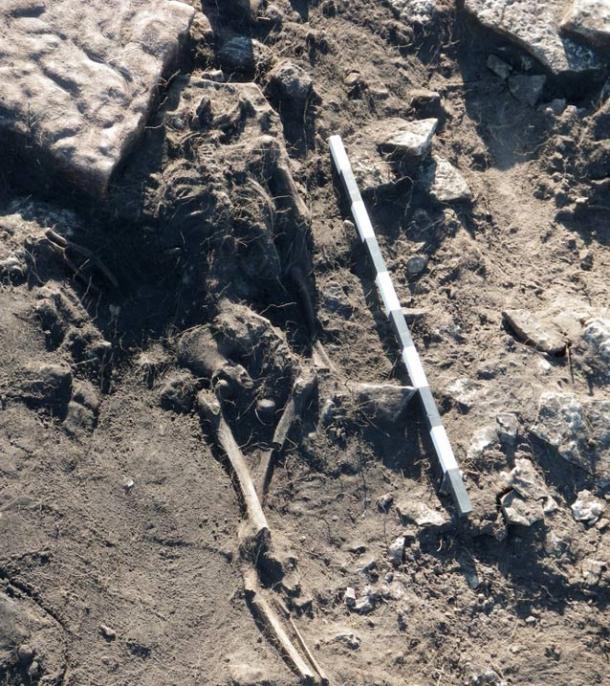The Sandby borg massacre refers to an ancient crime scene unearthed on the island of Öland in Sweden, where archaeologists uncovered evidence of a brutal slaughter approximately 1,500 years ago. The circumstances surrounding the massacre are currently unknown but the recent discovery of a child’s skeleton – the first child victim to be identified in the massacre – provides a new piece to the puzzle.

The original discovery was made during excavations of the Sandby borg ringfort on Öland. The team of archaeologists found the remnants of a small town, which appeared to have been a prosperous place where people lived comfortably in small huts and reared livestock for meat. But among the ruins of the town, they found the bodies of ten slain residents (with many more believed to remain buried). Two were found lying next to the door of a hut as if they had been slaughtered as they tried desperately to escape.
“I think they were ambushed in some way and people were running into the house trying to kill them and they didn’t have a chance,” said Helene Wilhelmson, a researcher who specializes in the study of bones at Sweden’s Lund University. “’It’s more of a frozen moment than you normally see in archaeology… Something terrible happened, and everything just stopped.”
From the evidence, it appears that the site was abandoned and remained untouched for 1,500 years. Even treasures like gilded brooches and jewelry were left at the scene and later uncovered at an earlier excavation in 2010. Archaeologists suggest that the location may have been taboo after the massacre, with people simply too terrified to return to the town.

Photo from the excavation of one of five caches of 5th century jewellery found at Sandby borg in 2010. Photo courtesy of Jan-Henrik Fallgren.
Discovery of a child skeleton
According to a news release on Past Horizons, another gruesome discovery was made in September this year during an excavation carried out by the Department of Museum Archaeology at Kalmar County Museum, in cooperation with students from Linnaeus University. Archaeologists unearthed the skeletal remains of an adult male, aged 50 – 60 years, along with a small child, aged 2 to 5 years, both of whom were lying face down in a fireplace in the center of a building. It is the first child to be identified among the victims of the massacre at Sandby borg. Until now, it was believed that only adults had been in the ringfort when the event took place.
According to Clara Alfsdotter, osteologist at the museum of Bohuslän who conducted an analysis of the remains and the scene, it appears the adults and child were struck down and fell into the burning fireplace.

This skeleton of an old man was found lying across the large fireplace in House 52. Next to him, a humerus of a small child (estimated to around 2-5 years old) was found. Photo courtesy of Kalmar County Museum.
One theory links the massacre to a reduction in Roman gold around the same time.
“It is well known that Öland in this period saw intensive contacts with the Roman Empire. In fact, nowhere else in Scandinavia have so many solidi [gold coins] been found as on Öland. Probably, many Ölanders travelled to work for the Roman Emperor getting paid with solidi which they brought back home,” write the research team. “Towards the end of the 5th century, there was a dramatic decrease in the solidus gold influx to Öland. The massacre at Sandby borg seems to have occurred around this date, making the potential connection with Roman gold a hotspot for further investigation.”
So far, only 3% of the ringfort has been excavated and the archaeological team are now trying to raise funds to complete their research.
“The reason these bodies have not yet been recovered is mainly financial; we strongly feel that – given the unique circumstances – we must uncover these humans in the proper way, and we must tell their story,” the research team writes on a crowdfunding page. One of the rewards for funding is to join the archaeological team on site at the next Sandby borg excavation.